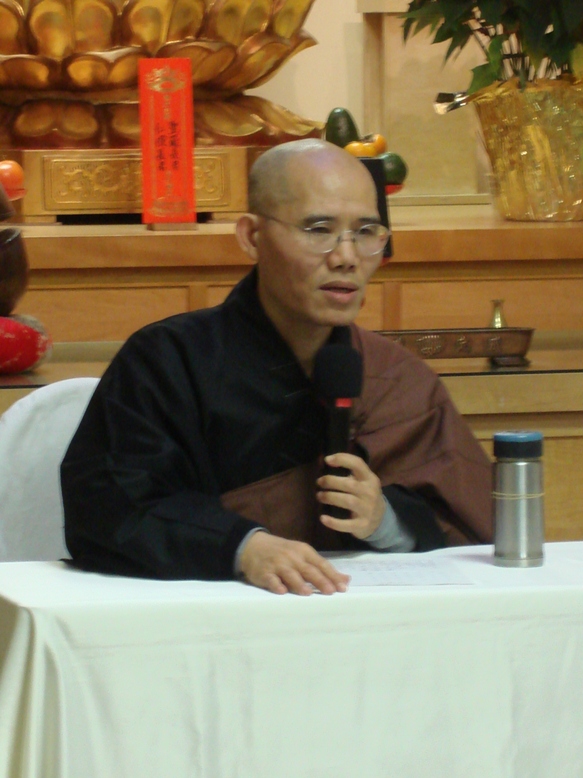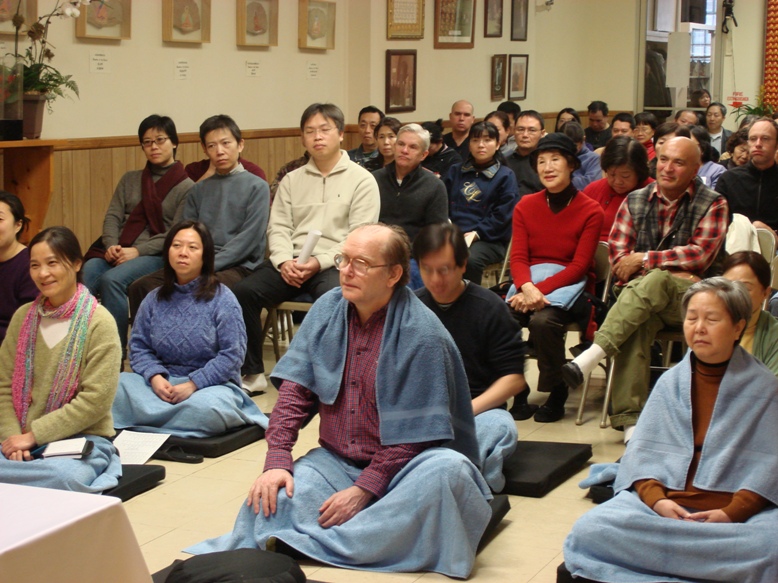
Chan Series - Part 2
Real Meditation Is No Meditation
By
Chang Jie
01/11/2009

On Sunday, January 11, 2009, Venerable Guo Xing, Abbot of
the Dharma Drum Retreat Center and Chan Meditation Center
gave a talk entitled, "Real Meditation is No Meditation" for
the second of the Chan lecture series.
Venerable opened the talk by stating that, to ordinary
people, real Buddhist practice may be defined as meditation,
prostrations, and reading sutras. Can mundane activities,
such as everyday chores and work, or arguing with someone,
be considered Buddhist practice?
This may really depend on oneís attitude and mindset at the
time. If you scold someone with no sense of self, and if
the situation requires it, then you are being
compassionate. You can test yourself by checking to see if
you can switch your attitude completely from one moment to
the next, from anger to that of gentleness.
This may really depend on oneís
attitude and mindset at the time. If you scold someone with
no sense of self, and if the situation requires it, then you
are being compassionate. You can test yourself by checking
to see if you can switch your attitude completely from one
moment to the next, from anger to that of gentleness.
When we meditate during a retreat, we
are constantly reminded to let go of wandering thoughts.
When we are not practicing on the cushion, we do not tell
ourselves, "I am having a wandering thought, so I should not
follow it." We actually follow our thoughts.

Ordinary people think sitting on the cushion is true
practice. But true practice is cultivating the precepts,
concentration and wisdom in order to achieve bodhi mind.
Every activity is real practice and every place is the Chan
Hall.
During retreat, the goal of most people may be to have a
concentrated mind and enter a state of tranquility and
peace. This samadhi practice will help reduce emotional ups
and downs and deal with minor vexations, but probably will
not be as useful for bigger problems, such as those of life
and death. For example, if someone is pointing a gun at
your head, will you be able to just relax and focus on your
breathing? If you donít transform your mindset and
understand that all phenomena are illusionary, impermanent,
and composed of the five skandhas, you will probably not be
able to deal with problems because you will think they are
real.
The term "wandering thought" in English does not quite
capture the Chinese term. We do not know where thoughts
come from or where they are going, so we call them
"wandering' but in the Chinese, the term is actually
"illusionary" thoughts. If you donít think of them as
illusionary and think they are real, you will follow them
and create more thoughts. The term "illusionary" does not
mean fabricated or not real. "Illusionary" means all things
exist because of causes and conditions arising and
perishing, and are impermanent and ever-changing.
Thoughts are comprised of the five skandhas. Dualistic
thoughts give rise to vexations. Venerable advised that we
treat everyday phenomena as not concrete or permanent but as
images projected by the mind or as merely a skandha or form.
To summarize the main points of the talk, Venerable
encouraged the audience that during daily practice, it is
good to cultivate samadhi so that the mind is more stable,
concentrated, and not as easily affected by emotions. But
it is very important to perceive that all five skandhas are
empty and that everything that we perceive is illusionary
and impermanent. If we cultivate wisdom and transformation
of the mind, when life and death situations occur, we will
have the power to deal with them.
|